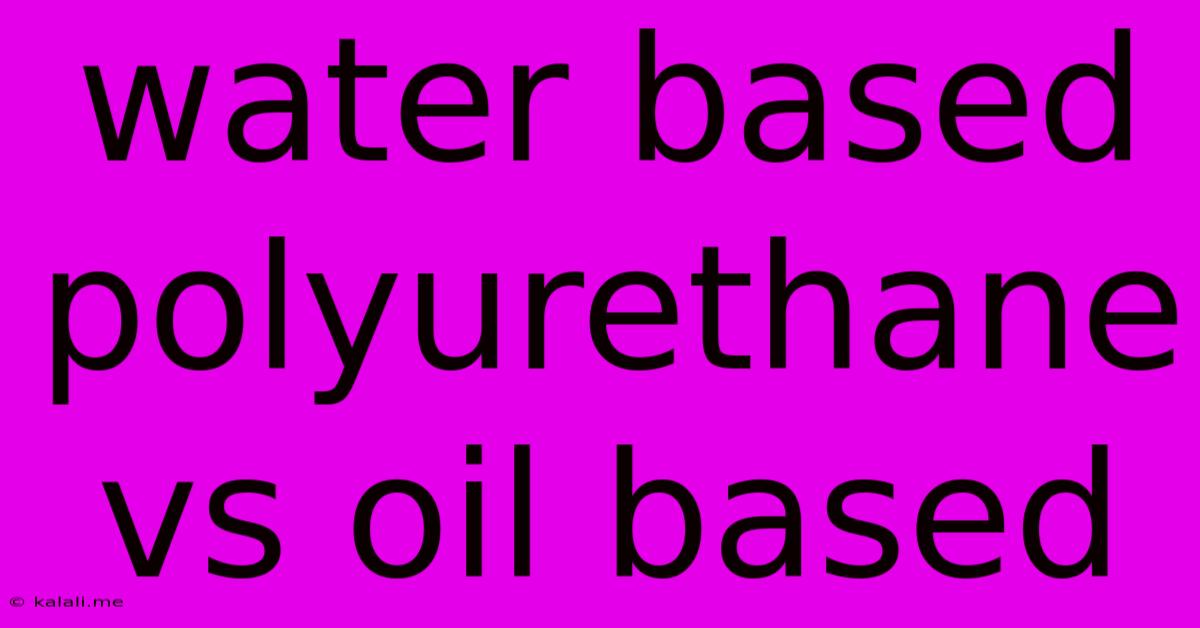Water Based Polyurethane Vs Oil Based
Kalali
Jun 04, 2025 · 3 min read

Table of Contents
Water-Based vs. Oil-Based Polyurethane: Which Finish is Right for Your Project?
Choosing the right polyurethane finish can significantly impact the look and durability of your woodworking project. This comprehensive guide will delve into the key differences between water-based and oil-based polyurethanes, helping you decide which option best suits your needs. Whether you're a seasoned craftsman or a DIY enthusiast, understanding these distinctions is crucial for achieving a professional-looking and long-lasting finish.
Understanding the Differences: A Head-to-Head Comparison
Both water-based and oil-based polyurethanes offer excellent protection for wood, but they differ significantly in several aspects:
Application and Cleanup
- Water-Based Polyurethane: Significantly easier to clean up. Soap and water are all you need, making cleanup a breeze. Application is also generally smoother, with less tendency to leave brush strokes. It dries much faster than oil-based polyurethane.
- Oil-Based Polyurethane: Requires mineral spirits or paint thinner for cleanup, adding an extra step and potentially requiring more safety precautions. It can be more challenging to apply smoothly, sometimes requiring more coats to achieve a uniform finish. Drying time is considerably longer.
Durability and Protection
- Water-Based Polyurethane: Offers excellent durability for interior applications, providing good protection against scratches, water damage, and UV exposure. However, it may not be as durable as oil-based polyurethane for high-traffic areas or outdoor use. Yellowing is less of a concern with water-based polyurethanes.
- Oil-Based Polyurethane: Known for its superior durability, making it a better choice for high-traffic areas, outdoor furniture, or projects requiring exceptional protection. However, it can yellow over time, especially in direct sunlight.
VOCs (Volatile Organic Compounds) and Odor
- Water-Based Polyurethane: Significantly lower in VOCs, making it a more environmentally friendly and healthier option for both the user and the environment. The odor is also much less pungent than oil-based polyurethane.
- Oil-Based Polyurethane: Contains higher levels of VOCs, contributing to stronger odors and potential air quality concerns. Proper ventilation is essential when working with oil-based polyurethanes.
Cost
- Water-Based Polyurethane: Typically more expensive per gallon than oil-based polyurethane. However, the ease of cleanup and faster drying times can save you time and effort in the long run.
- Oil-Based Polyurethane: Generally less expensive per gallon than water-based alternatives.
Finish Appearance
- Water-Based Polyurethane: Often results in a clearer, more natural-looking finish, allowing the wood grain to shine through.
- Oil-Based Polyurethane: Can sometimes create a slightly amber or yellowish tint to the finished product, particularly over time.
Choosing the Right Polyurethane for Your Project
The best choice ultimately depends on your specific needs and preferences:
-
Choose water-based polyurethane if: You prioritize ease of use, low odor, faster drying times, and a clear finish. Ideal for interior projects, furniture, and crafts where durability requirements are moderate.
-
Choose oil-based polyurethane if: You require superior durability and protection, particularly for outdoor projects or high-traffic areas. Acceptable if you don't mind a stronger odor, longer drying times, and the potential for slight yellowing.
Beyond the Basics: Additional Considerations
- Type of Wood: The type of wood you're working with can also influence your choice. Some woods are more prone to absorbing moisture, making water-based polyurethane a less suitable option.
- Environmental Concerns: If you are environmentally conscious, water-based polyurethane is the more sustainable choice due to its lower VOC content.
- Personal Preference: Ultimately, your comfort level with application and cleanup will also play a role in your decision.
By carefully considering these factors, you can select the polyurethane finish that best meets the demands of your project while ensuring a beautiful and long-lasting result. Remember to always follow the manufacturer's instructions for optimal results.
Latest Posts
Latest Posts
-
Term For Rest Break During Foot March
Jun 05, 2025
-
Sspi Handshake Failed With Error Code 0x8009030c
Jun 05, 2025
-
Keep The Facetime Video On Mac Switch
Jun 05, 2025
-
Cant View My Own Wishlist Steam
Jun 05, 2025
-
How To Delete White Background In Photoshop
Jun 05, 2025
Related Post
Thank you for visiting our website which covers about Water Based Polyurethane Vs Oil Based . We hope the information provided has been useful to you. Feel free to contact us if you have any questions or need further assistance. See you next time and don't miss to bookmark.